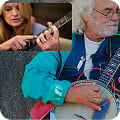Jazz Bass with John Patitucci
Preview this school

Master the Bass with John
Each lesson builds on the last, taking you from zero to hero!

Master jazz bass with legend John Patitucci. 322 lessons covering upright and electric bass from fundamentals through advanced improvisation.
Beginner Upright Bass
Build essential bass skills with scales, arpeggios, rhythm, ear training, etudes, and play-alongs.
Intermediate Upright Bass
Master 2-octave scales, jazz rhythms, and key listening skills for improvising.
Advanced Upright Bass
Strengthen your jazz voice with phrasing tools, bebop lines, and extended fingerboard use.
Music Theory
Develop key skills in reading music, understanding triads, and mastering chord structures.
Beginner Electric Bass
Build rock-solid electric bass skills with scales, arpeggios, etudes, and play-alongs.
Intermediate Electric Bass
Develop walking lines, 2-octave scales, and use play-alongs to build solid jazz groove feels.
Advanced Electric Bass
Develop confidence through advanced grooves, musical etudes, and stylistic variety.
30 Day Challenge
Get Personal Feedback with Video Exchange
Get custom video lessons from your instructor by sending a video of your playing.
How It Works?

1. Submit Your Video
Record and upload directly through our platform. No technical skills required.

2. Get Expert Feedback
Receive personal video responses from John Patitucci with tips to improve!

3. Learn from Community
Browse exchanges from other students to learn from their questions.
Join Students Thriving with John Patitucci!

ArtistWorks is a great place for musicians. The teachers are excellent and the structure of the lessons leads to improvement.
Reinhard
Student for 13 years
I wanted to start lessons again and I wanted quality lessons that were well organized, comprehensive as well as affordable and flexible with the ability to get personalized feedback from a professional. ArtistWorks hit all the markers. I highly recommend this company.
Leah
Student for 2 years
I have been a user of ArtistWorks for around eight years now. There are lessons and videos Exchanges which are like mini lessons themselves. The site is also a great place to interact with other musicians across the world. The great thing about the ArtistWorks video Exchange system is you get personal one to one feedback from your chosen Tutor. I was already an experienced Guitarist before I started. But there is always new things to learn.
Colin
Student for 8 yearsAbout Jazz Bass with John Patitucci
What makes these jazz bass lessons truly unique is that this is the only place online preserving the teaching feedback of John Patitucci through the library of videos submitted by students using the ArtistWorks Video Exchange Learning® platform. John reviewed each submission and recorded a video response, offering specific guidance to the student to take their bass playing to the next level. All students can access the Video Exchange library of over 1,000 Video Exchanges and watch these interactions with John. This library is comprehensive and may contain the key to unlock your playing.
About John Patitucci
One of the world’s most respected jazz bass players, John Patitucci has played with some of music’s biggest names including Wayne Shorter, Chick Corea, B.B. King, Herbie Hancock, Wynton Marsalis, Wayne Shorter, Dizzy Gillespie, George Benson, and many others. Known for his versatility, sensitivity and tone, Patitucci is widely regarded as one of today’s most influential jazz musicians and composers. John is the Artist in Residence at the Global Jazz Institute at Berklee College of Music, and continues to compose and record music that reflects his interests in jazz, classical, Brazilian, and pop. Since 2012 John has brought his love of teaching to ArtistWorks for students around the world.
What students are saying!
Hey John
I think all the good possible, John is the best, I'm sorry that there are no more exchange videos...
Great program
I've always wanted a jazz specific course for bass and having such a great teacher is exactly what I needed. Keep up the great work!
Excellent
Excellent
Splendid
John's very good at communicating his ideas. He also seems like a nice guy and that's important. I would have prefered some examples of how and what to play over some classic jazz...
Patiticci
Great
Excellent in all respects!
Taking lessons with ArtistWorks is excellent in all respects, signup, scheduling, clarity of video, clarity of concepts, forecast of future areas of study. For this reviewer, futur...
Patitucci Bass
Would like to see more theory, chord construction and functional analysis.

